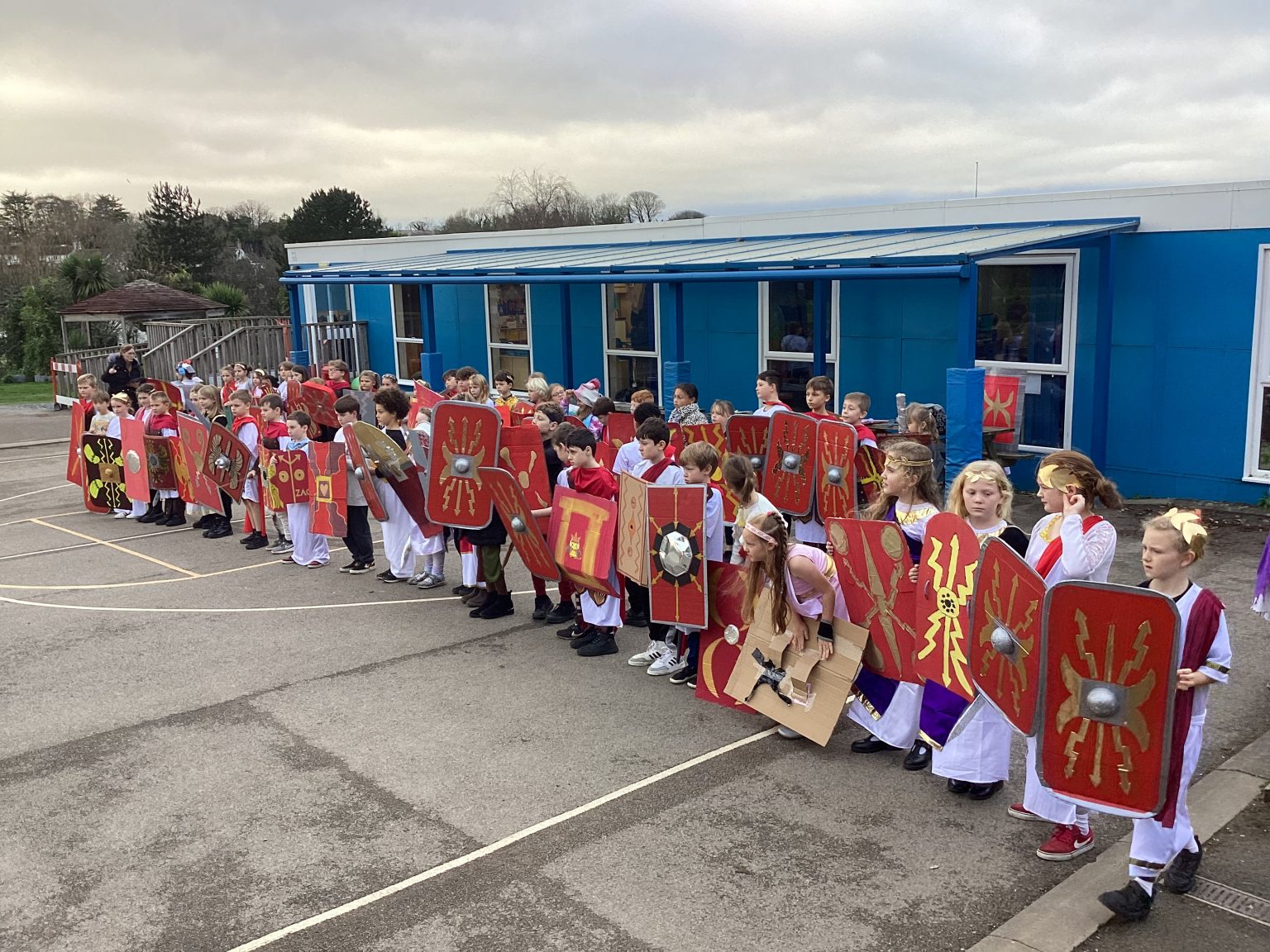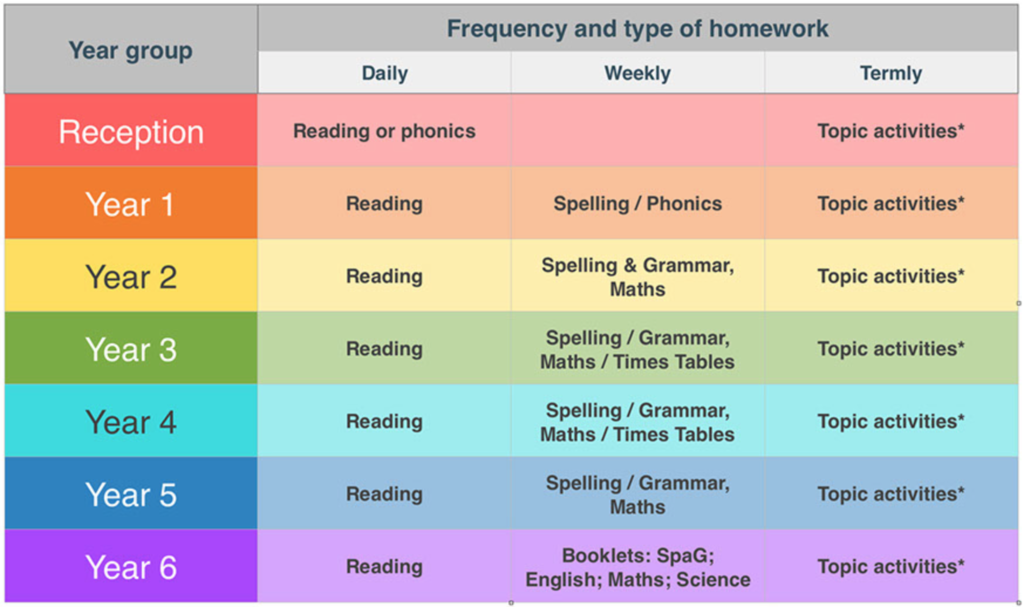
Curriculum Links
Homework
Welcome to our homework page. Here you will find information about the sort of homework that is expected each week from your child. In addition, our teachers have put together some downloadable pages of suggested activities relating to class topics.
What homework and when?
As you might expect, as pupils progress through the school, the level of homework will increase gradually. From reading to spelling to times tables, the expectations alter with each year group. The ‘Meet the Teacher’ session, in September, is the perfect opportunity to find out about the homework to be set in your child’s class. If you cannot attend this session, you are welcome to make appointments with our staff via the School Office.
As a rough guide, the table below gives examples of likely homework for each year group. Please note: this list is not exhaustive and your child’s teacher will adapt the homework according to the needs of the pupils and changes to the National Curriculum.

Topic activities for each term are downloadable from this page. Please note: they are not mandatory.
What is the purpose of homework?
Schools provide homework for a variety of reasons. At Penpol School, we believe that regular opportunities to undertake homework can benefit our pupils for the following reasons:
- It further demonstrates that learning can be fun
- It consolidates the skills we have taught in class
- It allows pupils to explore areas of interest within a topic, encouraging independent study
- It gives parents an insight into the learning that is taking place in class
- It encourages partnerships between parents and teachers
- It prepares pupils for secondary school – both in terms of workload and organisation
How to take the work out of homework
We are aware that, for many families, organising homework (such as weekly English and Maths activities) can feel like an extra chore, which inevitably defeats the main purpose: to demonstrate that learning can be fun! We want our parents to feel as confident as our pupils about what is expected for each class. With this in mind, we have put together some pointers for parents:
- Please don’t feel ‘burdened’ by homework! By the time they are juniors (Y3), pupils confidently adopt classroom routines and take on greater responsibility. Our teachers are promoting independence for this year group, but they will still remind students about school trips, parent letters, reading books and homework.
- Pupils know what to do if they get stuck. Part of the classroom discussion about homework includes strategies for overcoming common problems. For example, Who should you see if you are stuck? The Teacher. When should you see the teacher? Before the day it’s due in!
- Pupils succeed when it’s fresh in their minds. As you might expect, most children find homework more manageable if they attempt it as soon as it is set, rather than waiting until the night before it is due to be handed in.
- Helping a little helps a lot! We are delighted to have such supportive parents, who find the time to share in their children’s school activities. We’d like to thank you for your input and reassure you that there is no such thing as getting it wrong!
- Penpol teachers are very friendly. We hope that this page will help to alleviate any worries about homework expectations, but if you have a concern that has not been addressed, please make an appointment to see our lovely staff.
- Help is out there. For parents of older children, you may find that it’s a struggle to develop a homework routine that is manageable; you might even dread it! As a school, we don’t endorse any specific websites, but you may find articles, such as: http://www.theschoolrun.com/simple-strategies-end-homework-wars useful, so we thought we’d share it with you. Let us know if you find useful articles to share with other parents.
Marking homework
We reward genuine effort, rather than test scores alone. Where we see that pupils have challenged themselves to extend their learning at home, we will reward their effort with house tokens and stamps. Sometimes pictures of homework are shared on the Penpol Times or we might take a photo for our topics books. Spellings and times tables are tested and marked – as is most Maths and English – however, we do not give written feedback for all homework. Instead, it may be part of a class discussion, during which pupils are given verbal feedback. The format of marking is consistent with our marking policy. Needless to say, we like to make hard-workers feel special!
Topic activities
Please find below downloadable pages of homework suggestions for the topics your child will study this term. Please note: these activities are not mandatory. However, having successfully trialled this style of homework in Mrs Jane’s class, we have found that pupils are excited by the freedom of choice and the creative format.
As an incentive, teachers offer house tokens for maximum effort in homework. Some pupils have already featured in the Penpol Times for their extra-curricular efforts!
How often?
These pieces of work can be completed at any point during the term. Some children like to try something new every week, some pupils less often and some pupils need a little more encouragement.
In case you are wondering why we have included activities for last term… We endeavour to promote life-long learning, therefore it doesn’t matter whether or not we have finished a topic in class, our pupils are welcome to continue researching subjects that capture their imaginations, no matter what the time of year!
Activity Passport
Homework Ideas
Find ideas for home learning on the Reception Curriculum page by clicking here.
Find ideas for home learning on the Year 1 Curriculum page by clicking here.
Find ideas for home learning on the Year 2 Curriculum page by clicking here.
Find ideas for home learning on the Year 3 Curriculum page by clicking here.
Find ideas for home learning on the Year 4 Curriculum page by clicking here.
Find ideas for home learning on the Year 5 Curriculum page by clicking here.
Find ideas for home learning on the Year 6 Curriculum page by clicking here.
The Penpol Times

John Dyer inspired art from Year 6
In year 6 we have been creating a mural of Godrevy lighthouse:

Staff 8 – 6 Students
As is Penpol tradition, the departing Year 6 children had the opportunity

Penpol’s Got Talent 2024
As is tradition in the last week of term, our talented students

Year 2’s Marine Discovery
On Tuesday 2nd and Wednesday 3rd July, our Year 2 pupils embarked

Penpol win the Mayor’s Cup
Last week the Penpol School boys football team continued their success at






